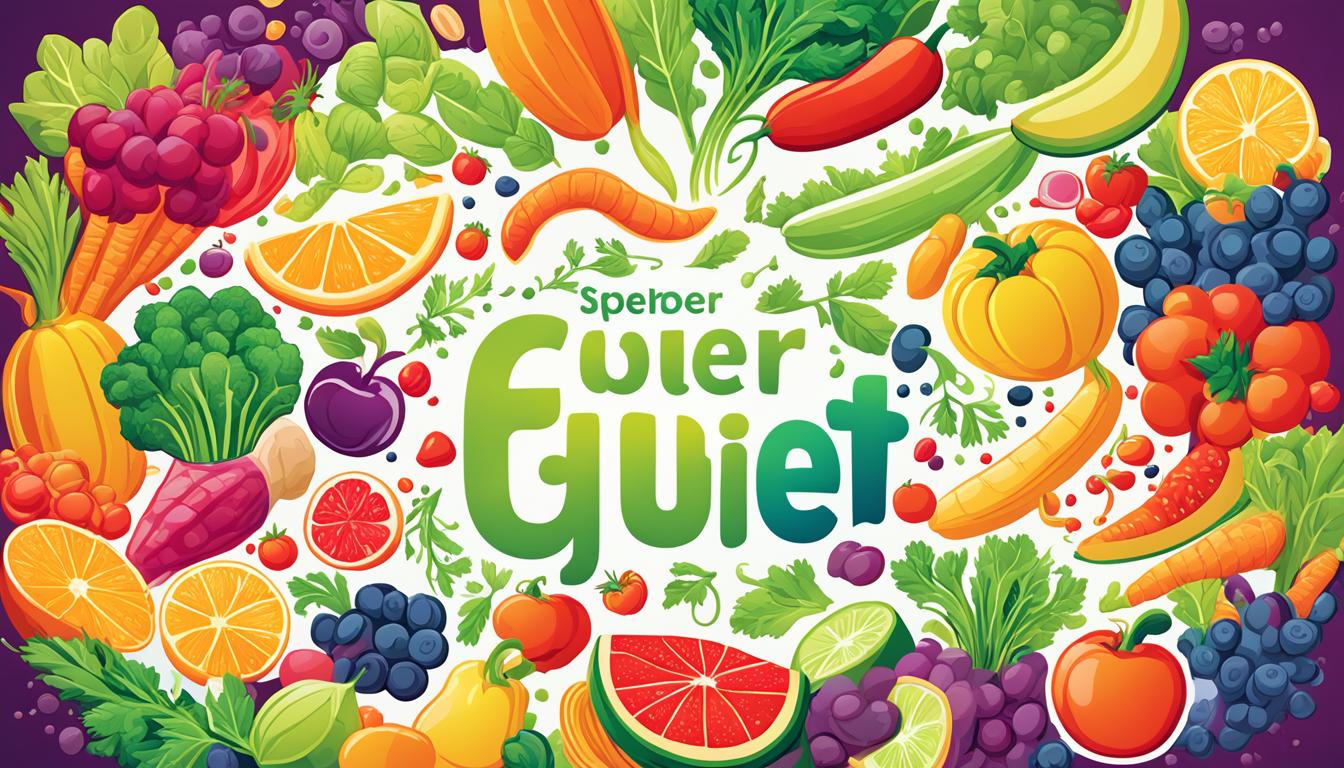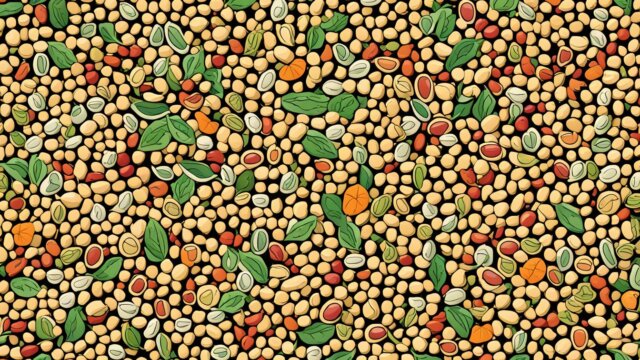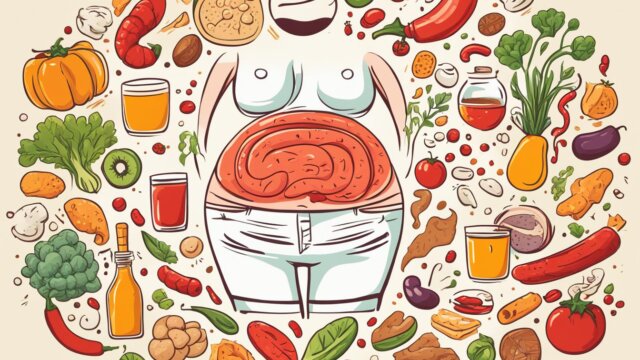FTC disclaimer: This post may contains affiliate links and we will be compensated if you click on a link and make a purchase.
Did you know you have about 200 different kinds of bacteria, viruses, and fungi in your gut? This mix of microbes is key to your health. It affects many conditions, like mental health issues and diseases.
Keeping your gut healthy is vital. But, many face issues like gas and constipation daily. In fact, 15% of people in Western countries have a bad gut problem called irritable bowel syndrome (IBS). Fiber is a hero that can make your gut better and boost your health.
Key Takeaways:
- Gut health is linked to many health issues, from mental health to autoimmune diseases.
- Digestive problems like IBS affect many, but fiber can help improve gut health.
- Foods high in fiber, prebiotics, and probiotics are key for a healthy gut.
- Less stress, good sleep, and avoiding processed foods also help gut health.
- Listening to your body can help you find and fix gut health problems.
The Gut Microbiome: A Key to Overall Health
The gut microbiome is a complex world inside us. It’s full of trillions of bacteria, viruses, and fungi. These tiny creatures help keep our bodies healthy.
What is the gut microbiome and why is it important?
The gut microbiome is the mix of tiny organisms in our gut. Everyone’s gut is different, based on what we eat, our lifestyle, and our environment. These tiny friends affect our health in big ways, like our immune system and our mood.
How does the gut microbiome affect your health?
Having a healthy gut is key for good digestion, a strong immune system, and feeling good mentally. Too many bad microbes can lead to many health problems, like bowel diseases, autoimmune issues, and mental health problems.
Feeding the good microbes in our gut helps our health and lowers disease risk. Foods high in fiber, fermented foods, and probiotics help keep our gut happy and full of life.
Learning about the gut microbiome and how to support it is key for staying healthy. By living a gut-friendly life, we can make the most of this tiny world inside us.
Signs of an Unhealthy Gut
Your gut health is key to feeling good. Many things in modern life can hurt your gut balance, causing symptoms. If you have ongoing digestive problems, weight changes, sleep issues, skin troubles, or autoimmune diseases, your gut might be unhealthy.
Upset Stomach and Digestive Issues
About 70 million Americans deal with digestive diseases yearly. This includes irritable bowel syndrome (IBS) and gastroesophageal reflux disease (GERD). Signs like gas, bloating, constipation, diarrhea, and heartburn mean your gut bacteria might be out of balance.
Diet High in Sugar and Processed Foods
Eating too much processed food and sugar can lower “good” gut bacteria. This leads to more inflammation. It can cause many health problems, from digestive issues to chronic diseases.
Unintentional Weight Changes
Weight changes without a reason can mean an unhealthy gut. Your gut affects your metabolism and hunger. An imbalance can mess with these important functions.
Sleep Disturbances and Fatigue
Most of the body’s serotonin, which helps with mood and sleep, comes from the gut. An unhealthy gut can cause insomnia or poor sleep, making you feel tired and slow.
Skin Irritation and Autoimmune Conditions
Skin problems like rashes and eczema can come from gut bacteria imbalance. Also, autoimmune diseases like thyroid issues, rheumatoid arthritis, and type 1 diabetes might start from “bad” gut bacteria.
Food Intolerances
Often having food intolerances can show poor gut health. A balanced gut microbiome is key for good digestion and absorbing nutrients.
If you notice these symptoms, it’s time to check your gut health. Making lifestyle changes can help your digestive wellness.

“Keeping a healthy gut is vital for overall health. Noticing signs of an unhealthy gut can lead you to improve your digestive and immune health.”
Improving Gut Health Naturally
Keeping your gut healthy is key to feeling good overall. You can easily make changes to help your gut. By cutting stress, sleeping well, eating slowly, and drinking water, you help your gut thrive.
Reduce Stress and Get Quality Sleep
Stress hurts your gut health because your brain and gut talk to each other. Stress makes your body release hormones that mess with your gut bacteria balance. Try to relax with meditation, yoga, or deep breaths every day. Also, getting enough sleep helps your gut bacteria grow strong.
Eat Slowly and Stay Hydrated
Eating slowly helps your digestion and gut health. Eating fast can make you swallow air, causing bloating. Drinking water, about half your weight in ounces, keeps your digestive system working right.
Consider Prebiotics and Probiotics
Adding prebiotics and probiotics to your food helps your gut. Prebiotics feed good gut bacteria, while probiotics are live helpers. You can find probiotics in foods like yogurt, kimchi, kefir, and sauerkraut. But be careful with probiotic pills, as they can cause problems if not taken right.
Identify and Avoid Food Intolerances
Food intolerances can make you feel bad and hurt your gut. If you always have diarrhea, gas, or bloating, see a doctor to find out what foods bother you. Cutting out those foods can make you feel better overall.
Adopt a Fiber-Rich, Gut-Friendly Diet
Eating foods high in fiber and whole foods is good for your gut. Eat lots of plants like grains, fruits, veggies, and beans to feed your gut bacteria. Stay away from too many processed foods and sugars to keep your gut happy.
Using these natural ways, you can help your gut health and feel better overall. Always talk to a doctor if you have ongoing gut problems or worries.

Fiber and Gut Health: A Powerful Connection
Dietary fiber is key to a healthy body. It’s often ignored but vital for gut health. This supports your overall health. Prebiotic fibers feed the good bacteria in your gut, keeping them healthy.
Fiber and gut health are closely linked. Foods like beans, lentils, and fruits feed your gut’s good bacteria. These bacteria make short-chain fatty acids. These acids help with inflammation and keeping a healthy weight.
Average Americans don’t get enough fiber. They need 25 grams of fiber a day but get only 15. Not getting enough fiber hurts gut health and overall health.
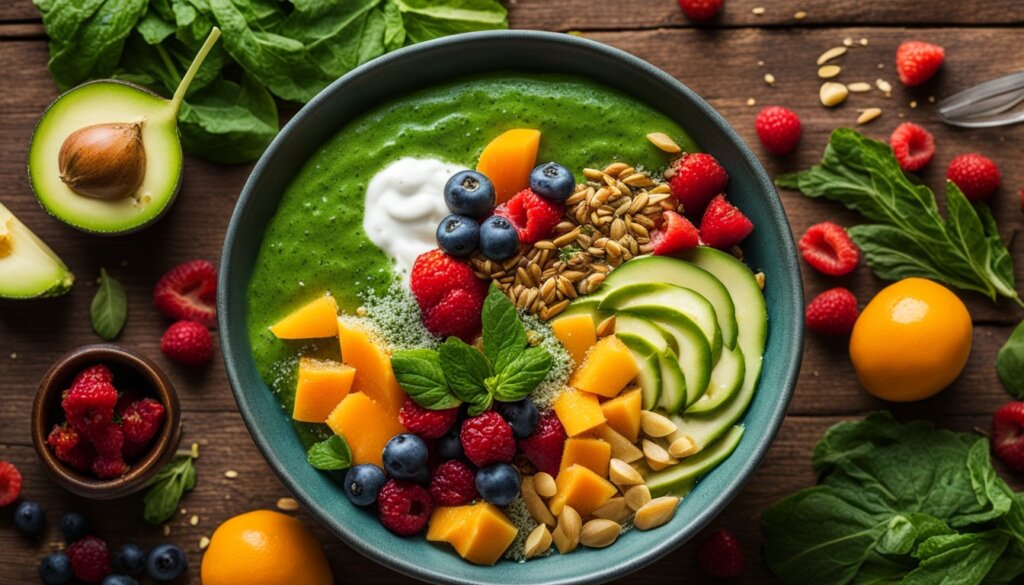
Eat more fiber-rich foods to improve your health. Include foods like oats and fruits in your meals. Also, eat whole grains and nuts for more fiber. Drink plenty of water too, as it helps fiber work better.
Adding fiber to your diet helps your gut microbiome and overall health. Fiber is powerful for gut health and your overall health.
Superfoods for Gut Health
Keeping your gut healthy is key to feeling good. Some superfoods can really help your digestive system. Foods like legumes, whole grains, and fermented foods are great for your gut health.
High-fiber Foods
Legumes, like beans, lentils, and chickpeas, are full of prebiotic fiber. This fiber feeds the good bacteria in your gut. Whole grains, such as oats and quinoa, also have lots of fiber. They help your gut microbiome stay diverse and healthy.,
Garlic and Fermented Foods
Garlic is a superfood that helps good gut bacteria grow. Fermented foods, like kimchi, sauerkraut, and yogurt, are full of probiotics. These probiotics can balance your gut microbiome.,
Collagen-boosting Foods
Certain foods, like bone broth and salmon, are high in collagen. Collagen can help keep your gut lining strong and support your digestive health.
Superfood | Gut Health Benefits |
|---|---|
Leeks | Contain up to 16% inulin, supporting a healthy gut. |
Greek Yogurt | If labeled as containing “live cultures,” it is full of probiotics beneficial for gut health. |
Fresh Ginger | Can be chopped or grated in soups, stir-fries, or drinks for gut health benefits. |
Dandelion Greens | A source of prebiotic fiber that feed the good bacteria in the gut. |
Chia Seeds | Rich in fiber and omega-3 short-chain fatty acids, beneficial for gut health. |
Turmeric | Rich in curcumin, known for its anti-inflammatory properties., |
Adding these superfoods to your meals can help your gut stay healthy. This can make you feel better overall.
Fiber and Gut Health: The Benefits
Fiber is key to a healthy gut. It feeds the good bacteria in your gut, helping them grow. This process makes short-chain fatty acids that keep the colon cells working right. Fiber also keeps the gut lining strong, acting as a shield. It helps keep the gut bacteria balanced and diverse.
Feeds Beneficial Gut Bacteria
Prebiotics are in foods like onions, asparagus, bananas, artichokes, and whole wheat. They’re added to supplements to boost gut health. These fibers feed the good gut bacteria, helping them grow and thrive.
Supports Production of Beneficial Compounds
Gut bacteria turn fiber into short-chain fatty acids. These acids are vital for gut health. They include butyrate, acetate, and propionate, which fight inflammation and help the immune system.
Maintains Gut Lining Integrity
Fiber keeps the gut lining strong, acting as a barrier. This stops bad stuff from getting into the bloodstream. Fiber helps prevent inflammation and leaky gut syndrome.
Promotes a Balanced Gut Microbiome
A healthy gut has a balanced mix of bacteria. Fiber helps keep this balance by feeding the good bacteria. This stops bad bacteria from taking over. It improves digestion and immune health.
Fiber supports healthy gut bacteria and makes beneficial compounds. Eating more fiber-rich foods can boost your gut health and overall well-being.
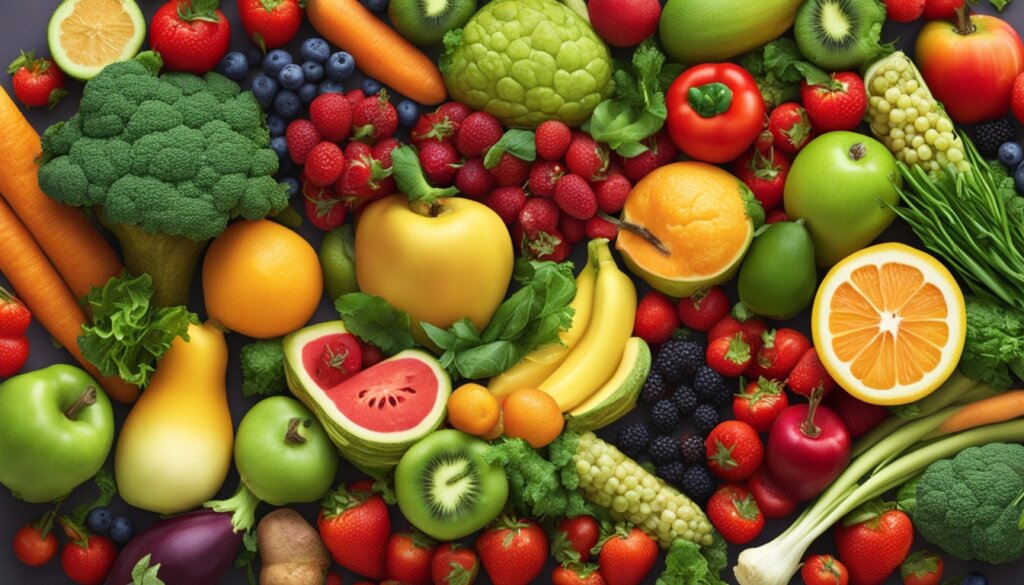
Fiber Intake Recommendations | Women | Men |
|---|---|---|
Under 50 years old | 25 grams per day | 38 grams per day |
50 years and older | 21 grams per day | 30 grams per day |
“Fiber helps maintain the integrity of the gut lining, which acts as a protective barrier, and promotes a balanced, diverse gut microbiome.”
Eating more fiber-rich foods helps your gut health. This supports your overall well-being and brings many benefits.
The Power of Prebiotics
Prebiotics are a special kind of fiber that helps keep your gut healthy. They don’t add new bacteria as probiotics do. Instead, they feed the good bacteria you already have, helping them grow and work better. Prebiotics are found in foods like onions, bananas, and whole wheat, making it easy to eat your way to a healthier gut.
What are Prebiotics?
Prebiotics are fibers from plants that help good gut bacteria grow and work better. They don’t get broken down in the upper part of your stomach. So, they reach the lower part where they get eaten by gut bacteria. This process makes short-chain fatty acids, which are good for your health.
Prebiotic Fiber Sources
You can find prebiotics in many high-fiber foods, such as:
- Onions, garlic, and leeks
- Bananas, apples, and berries
- Whole grains like oats and barley
- Legumes, such as lentils and chickpeas
- Chicory root and Jerusalem artichokes
Some foods and supplements also have added prebiotics to make them healthier.
Prebiotics and Gut Bacteria
Prebiotics are key to keeping your gut microbiome healthy. They feed the good bacteria, keeping your gut balanced and healthy. This balance is important for your immune system, reducing inflammation, and helping with metabolism.
“Prebiotics are the food that feeds the good bacteria in your gut, helping them thrive and keep your digestive system healthy.”
Eating foods high in prebiotics is a great way to support your gut and overall health. Start with a little and slowly add more to avoid stomach upset.
Dietary Tips for Optimal Gut Health
Keeping your gut healthy is key for your overall health. It helps prevent serious diseases like heart disease, diabetes, stroke, irritable bowel syndrome, and cancer. Eating foods rich in fiber is a great way to support your gut.
Whole Grains and Leafy Greens
Whole grains and leafy greens are great for your gut. Foods high in fiber like these feed good gut bacteria. Include whole grains like brown rice, quinoa, and oats, and leafy greens like spinach, kale, and arugula in your meals.
Lean Proteins and Low-Fructose Fruits
Lean proteins and low-fructose fruits are also good for your gut. Choose lean meats like chicken, turkey, or fish for their nutrients without the extra fat. Opt for fruits like berries and citrus that are easy on your stomach.
Avocados and Portion Control
Avocados are great for your gut because they’re full of fiber and nutrients. But watch how much you eat because they’re also high in fat. Eating the right amount and listening to your body can keep your diet balanced and gut-friendly.
Eating a mix of fiber-rich foods helps your gut microbiome and boosts your digestive health. Talking to a health expert or dietitian can give you advice on what foods are best for your gut.
Food Category | Gut-Friendly Examples |
|---|---|
Whole Grains | Brown rice, quinoa, oats |
Leafy Greens | Spinach, kale, arugula |
Lean Proteins | Chicken, turkey, fish |
Low-Fructose Fruits | Berries, citrus |
Fiber-Rich Foods | Avocados, nuts |
“Adopting a balanced, fiber-rich diet is crucial for maintaining a healthy gut microbiome and supporting overall digestive wellness.”
Slow changes and eating the right amount are important for better gut health. By choosing foods that are good for your gut, you can make your digestive system healthier.
Conclusion
Fiber is key to a healthy gut microbiome, which boosts your overall health. It feeds good bacteria, makes helpful compounds, and keeps your gut lining strong. Eating more whole grains, veggies, and fruits can help your gut health a lot.
Fiber and gut health are closely linked. Eating a lot of fiber helps with sugar and cholesterol levels, nutrient absorption, and making SCFAs. These are important for a healthy gut and body. Fiber also helps keep your gut bacteria diverse, grows good bacteria, and lowers the risk of diseases like colon cancer and diabetes.
Adding more fiber-rich foods to your diet is a great way to improve your gut and overall health. A diet full of fiber is key for a healthy gut and lowers the risk of many diseases. It also helps with sleep, weight, and metabolism. Choosing fiber-rich foods is an easy way to support your gut and enjoy the benefits of a healthy microbiome.
FAQ
What are the signs of poor gut health?
Poor gut health can show as feeling tired, having an upset stomach, skin problems, and autoimmune issues. You might also experience gas, constipation, diarrhea, bloating, and heartburn.
How does the gut microbiome affect overall health?
The gut microbiome is linked to our mental health, autoimmune diseases, and many other health issues. It also affects endocrine conditions, gastrointestinal disorders, heart disease, and cancer. A healthy balance of gut bacteria is key to good health.
What lifestyle and dietary factors can harm the gut microbiome?
Stress, not enough sleep, and eating too much processed and sugary food can hurt our gut microbiome. This can lead to inflammation and other health problems.
How can you improve and reset your gut health?
To boost gut health, try to reduce stress, get enough sleep, eat slowly, and drink plenty of water. Adding prebiotics or probiotics and finding out what foods you’re intolerant to can also help. Eating a diet rich in fiber is also good for your gut.
Why is fiber important for gut health?
Fiber is crucial for a healthy gut microbiome. It feeds the good bacteria, helps make helpful compounds, keeps the gut lining strong, and keeps the microbiome balanced.
What are prebiotics and how do they benefit gut health?
Prebiotics are a type of plant fiber that don’t get broken down in the gut. They feed the good bacteria, helping to keep your microbiome diverse and healthy.
What are some of the best foods for gut health?
Foods high in fiber like whole grains, veggies, and fruits are great for your gut. Also, garlic, fermented foods, and foods rich in collagen are good choices. Eating a diet full of fiber is important for a healthy gut.
